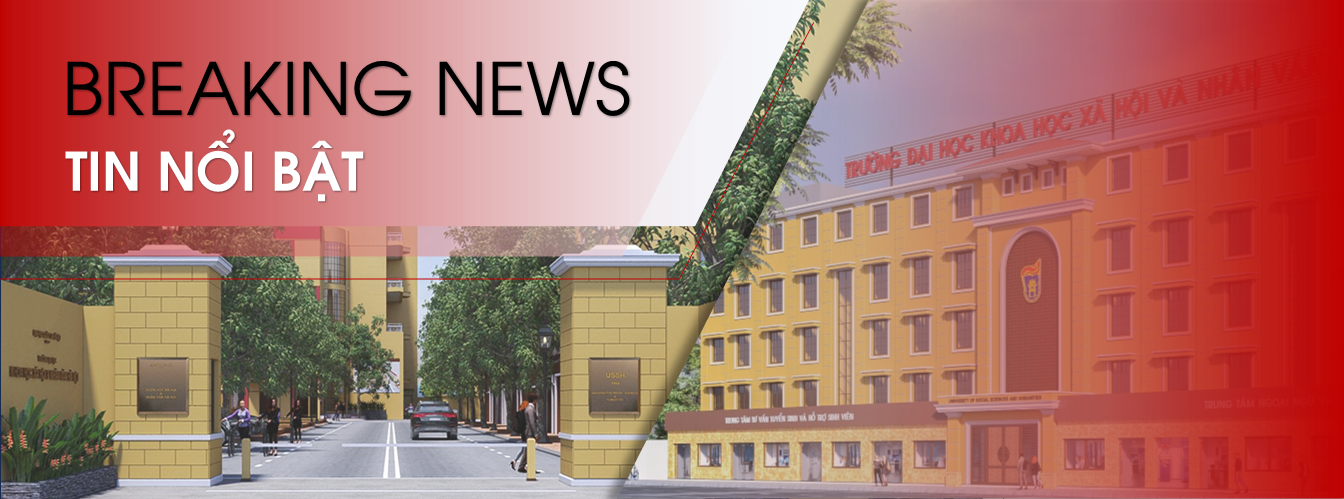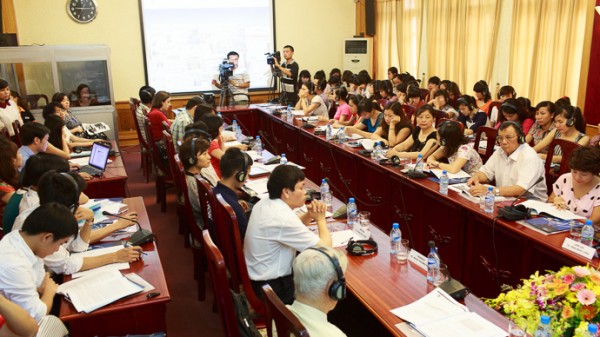On May 29, 2013, the Faculty of Journalism and Communication (University of Social Sciences and Humanities, Vietnam National University, Hanoi) collaborated with the Konrad Adenauer Stiftung Institute (Germany) to organize an international seminar on the topic "Models of Economic Journalism in Vietnam and Germany: The Landscape of Economic Information in the Media". The seminar aimed to clarify the current state of economic journalism in Germany and Vietnam, share experiences in developing economic journalism, and discuss skills in handling and conveying economic information in the media.
Presenters at the seminar included many renowned journalists and experts in journalism and media, such as Miriam Viola von Wrochem (Federal Republic of Germany's Committee for Culture and Media), Dr. Tran Ngoc Chau (General Director of FBNC economic and financial television channel), Dr. Dang Duc Long (Deputy Editor-in-Chief of the Financial Times), etc.
Speaker Miriam Viola von Wrochem presented a paper on the economic context of Germany and Europe as reflected in the German press and the role of the Federal Press Office in regulating information and assisting journalists in finding information on policies, data, and other economic issues related to the country. The paper highlighted a crucial point: for a professional and thriving economic press, a reliable, professional, transparent, and accountable source of economic information from the government is essential.
Dr. Dang Duc Long delivered a sharp and engaging presentation on the challenges facing Vietnamese economic journalism during the integration process. The author noted that, along with the country's development during the period of reform and international integration, economic information is increasingly occupying a large proportion across all media formats, including print, television, radio, and online. Vietnamese economic journalism is currently experiencing strong growth to affirm its true stature and position, as well as to meet societal needs. However, the quality of information and professionalism in the work of economic journalists still present many issues that need to be discussed. Journalist Duc Long emphasized that the three most important characteristics that need to be ensured for economic journalistic information are accuracy, accessibility, and objectivity. Economic journalists must possess specialized economic knowledge and strong professional skills, high journalistic ethics in handling and presenting objective information to the public, and a commitment to continuous learning and self-training. Journalism training institutions need to have specialized training programs in economic journalism. A sound financial mechanism is also crucial for the healthy and professional development of economic journalism.
Dr. Tran Ngoc Chau shared practical and relevant lessons on how to successfully build and develop a financial and economic television channel in Vietnam using a socialized model. According to the founder and top executive of FBNC, economic journalism requires constant caution because it is easily subject to suspicion, and those involved are easily tempted by investors. To achieve success and a unique brand, FBNC has established the following principles: necessity, accuracy, seriousness, and respect for values. Gathering information from multiple sources and ensuring transparency are also crucial elements of economic journalism.
Journalist Si Hoang (Vietnam Economic Times) shared his personal experiences in self-training and growth to become a professional journalist in the field of economic journalism. He believes that the trend of journalism focusing on niche areas will increasingly develop in Vietnam. Working in a specialized field is truly a challenge for those already working professionally, as it requires in-depth knowledge, almost like that of an expert, a keen understanding and sensitivity to practical situations, and a high level of passion for the profession. Many economic news outlets, especially those specializing in niche economic sections, face difficulties in recruiting staff. After many years in the profession, when transitioning to economic journalism, journalist Si Hoang himself had to participate in many in-depth courses on finance and economics to acquire knowledge equivalent to someone working in this field, in order to meet the job requirements. He also highlighted the "risk" that journalism students are currently facing fierce competition from economics and finance students in their professional field.
A central theme throughout the discussions at the seminar was what journalism training institutions should do to train economic journalism experts. Since 2012, in response to new demands on the journalism profession, the Faculty of Journalism and Communication at the University of Social Sciences and Humanities has added Group A (science and engineering) to its admissions process to standardize the admission ratios across different groups. In addition, the Faculty plans several solutions: providing students with specialized knowledge from economic experts, teaching economic journalism skills from professional journalists working in the economic field; expanding cooperation with universities specializing in economics and finance, as well as companies, banks, and economic corporations to enhance students' knowledge and experience; organizing numerous economic seminars for media professionals and students specializing in economics; and publishing publications, radio programs, and television programs on economics created by students during their studies…




